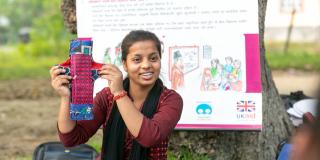
Around the world many girls living in poverty dread their period because of the devastating impact it can have on girls’ futures, their safety and wellbeing. VSO communication coordinator Priyanka Budhathoki shares five sustainable methods from the Sisters for Sisters’ education project, which are making a lasting difference to girls living in rural Nepal.
1) Homemade sanitary pads
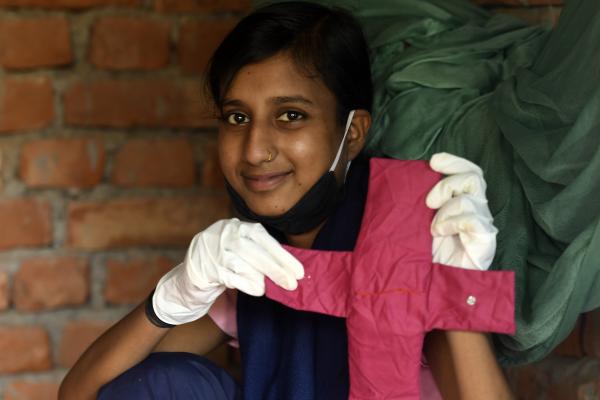
Helping girls make reusable sanitary pads means they won’t be left out of learning because they can now manage their period.
“One of the major reasons girls drop out of school is because of their menstruation,” explains Priyanka. “Girls cannot go to school during their period because there is no proper cleanliness or sanitation available, and they have limited access to menstrual products such as pads.”
To help girls stay healthy and in school VSO volunteers called Big Sisters are trained how to make reusable sanitary products using materials they have at home. They then share their knowledge with women and girls in their community.
Big Sisters are young girls in the community who have faced challenges and overcome them. As part of the Sister for Sisters' project they are paired with younger vulnerable school girls, referred to as their Little Sister, in their neighbourhood to help them through their own challenges.
Since the COVID-19 pandemic began, Priyanka explains that Big Sister training has been a lifeline to girls who want to continue their studies. “COVID has created a big problem from a menstrual hygiene perspective. Girls were unable to access menstrual products because people who could afford to had already stocked up. And so, in a socially distance way, our Big Sister volunteers helped train the girls and provided support to make reusable pads.”
So far, over 4,600 women and girls have received training and, thanks to the ripple effect of sharing knowledge and skills within a community, many more women and girls will benefit as a result.
2) Big Sister mentoring
“The most proactive thing that happens is definitely the Big Sisters,” explains Priyanka when asked about the Sisters for Sisters' project. “They are very close with the Little Sister and her family.”
Big Sisters are trained in adolescent reproductive health and know how to spot signs that a vulnerable girl is being treated differently while she’s on her period.
“Period stigma is deeply rooted in some parts of Nepali society. For example, girls are kept in isolation for about seven days and are not allowed to sit with their family and eat a meal together or even see male family members. Most of them miss school during their period.”
In western parts of Nepal, chhaupadi, the ancient tradition where menstruating girls isolate in a hut, is still practised despite being made illegal in 2015.
“Big Sisters are aware of every good and bad thing that's happening to a girl so she can instantly intervene if anything wrong or anything negative is happening, especially to the girls and also the family.”
3) Access to products at school
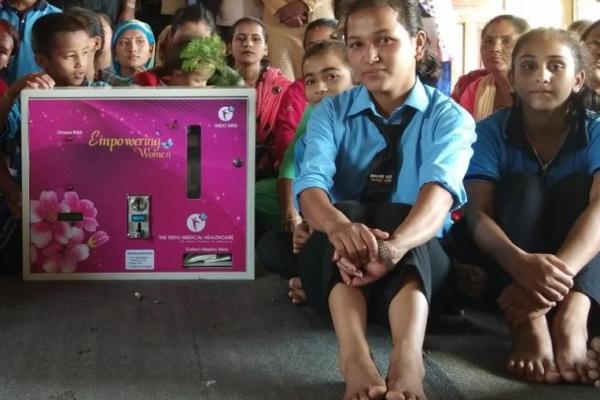
Look closely and you’ll read the message on the front of the machine, ‘Empowering women,’ an important message for girls to see every day while they are at school.
“One of the greatest achievements so far is that we now have sanitary pads in schools, so no girl will be left behind or have to miss school during her menstruation time. That's number one,” explains Priyanka.
Installing a sanitary pad dispensary machine at school is a significant development in rural Nepal where menstruating girls are often forbidden from attending school due to local beliefs. Making products available sends a positive message to girls that a school, a community and a municipality are all pledging to stand up against discrimination.
By working closely within the community and advocating for girls’ rights over time, projects like Sisters for Sisters' have been effective at helping girls access sanitary products quickly, affordably, and independently when they need it.
4) Theatre performances
Girls who face period stigma can be made to feel isolated inside their own home and it can lead to low self-esteem.
Priyanka explains that interactive theatre performances and workshops run by VSO give girls the confidence they need to find their voice, advocate for their menstrual health and rights, access services and take control of their lives.
“Theatre can be street drama, a form where they act or perform the real story of the community,” she tells us. “Big Sister volunteers have played a lot of this drama on menstruation taboos and chhaupadi in the community, and this has helped bring awareness and change people’s mindset.”
5) Hygiene kits
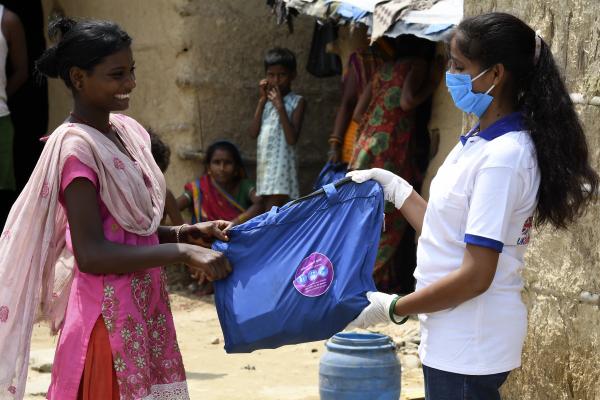
Big Sister Muni Gupta (left) handing a hygiene kit to a vulnerable girl within the community.
At the start of the COVID-19 pandemic, access to sanitary products was one of the biggest barriers between girls and their education.
Therefore, as part of VSO’s emergency response 4,000 hygiene kits including sanitary products were distributed to girls across rural Nepal – especially in areas where menstrual stigma exists.
Hygiene kits gave girls back their dignity and meant they could focus more on their studies. The kits included soap, underwear, and a hygiene kit bag.
Big Sisters like Muni Gupta (photographed) helped distribute hygiene kits to vulnerable girls and provided orientation to the families on how to get the most out of the kits.
Projects like this help put an end to period poverty and stigma so that girls can have a brighter future. But there is still a lot more to do. Can you imagine if menstruation was no longer a barrier to girl’s education in developing countries? It could help end patriarchal traditions that are keeping girls from reaching their full potential
Make a Lasting difference
If you believe in a fair world for everyone and want to make a lasting difference, you can consider leaving a gift in your Will to VSO. It costs you nothing during your lifetime but can make an incredible difference after you are gone. If you would like more information about leaving a gift in your Will to VSO please contact Rosie O’Connor, our Legacy Engagement Manager at legacies@vsoint.org or call 020 8780 7500.
Read more
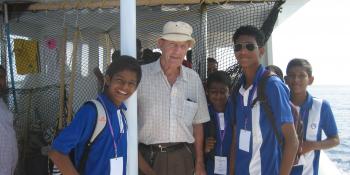
Transforming lives through education: Geoffrey’s VSO legacy
With a deep belief in the transformative power of education, Geoffrey from Norfolk, UK, has devoted his life both in the UK and abroad to making education more accessible for all.
